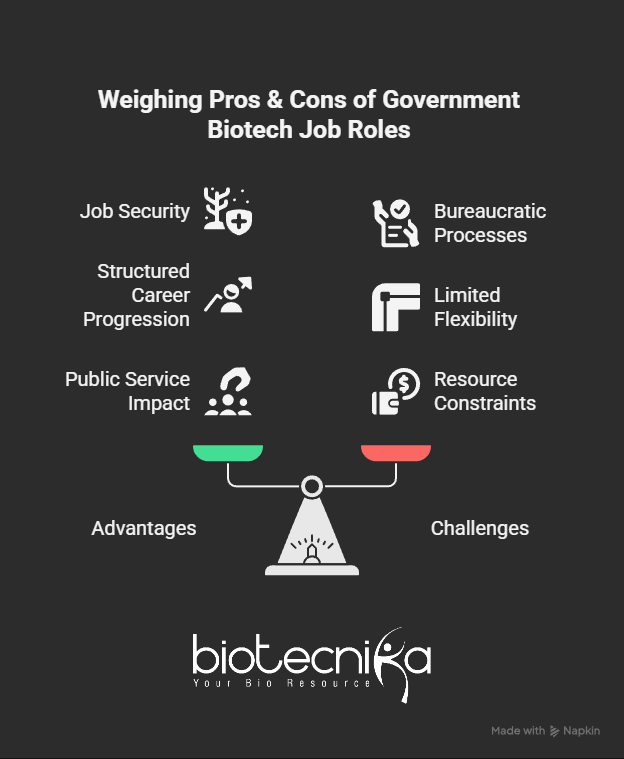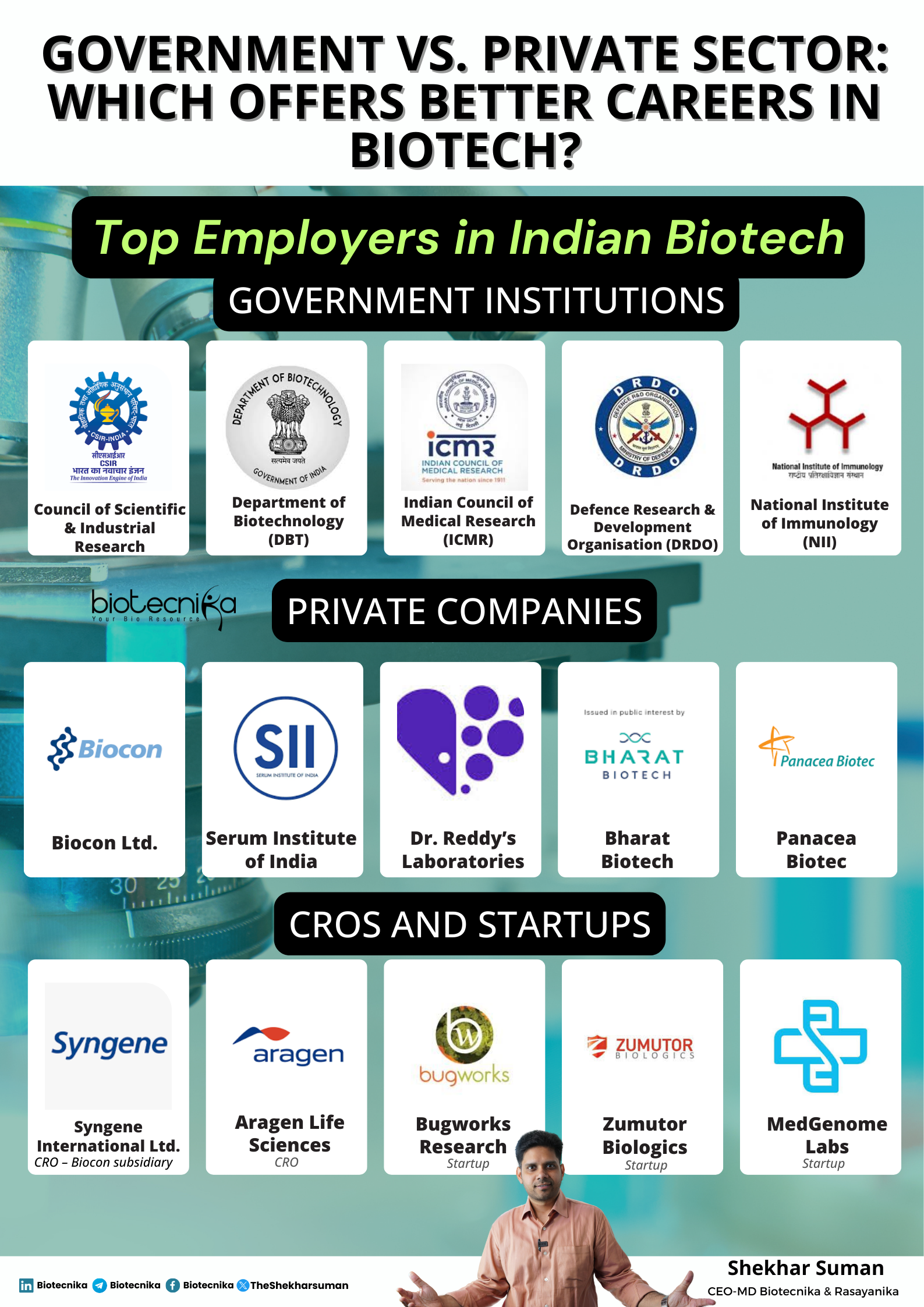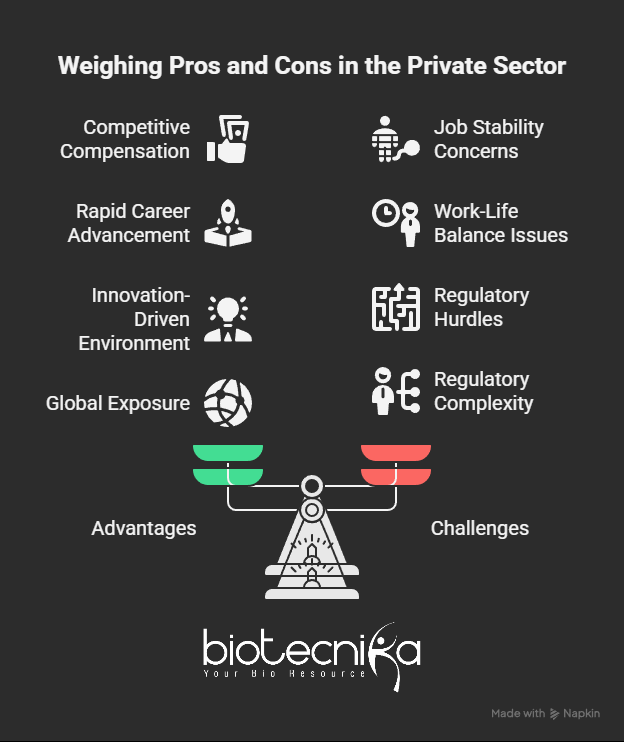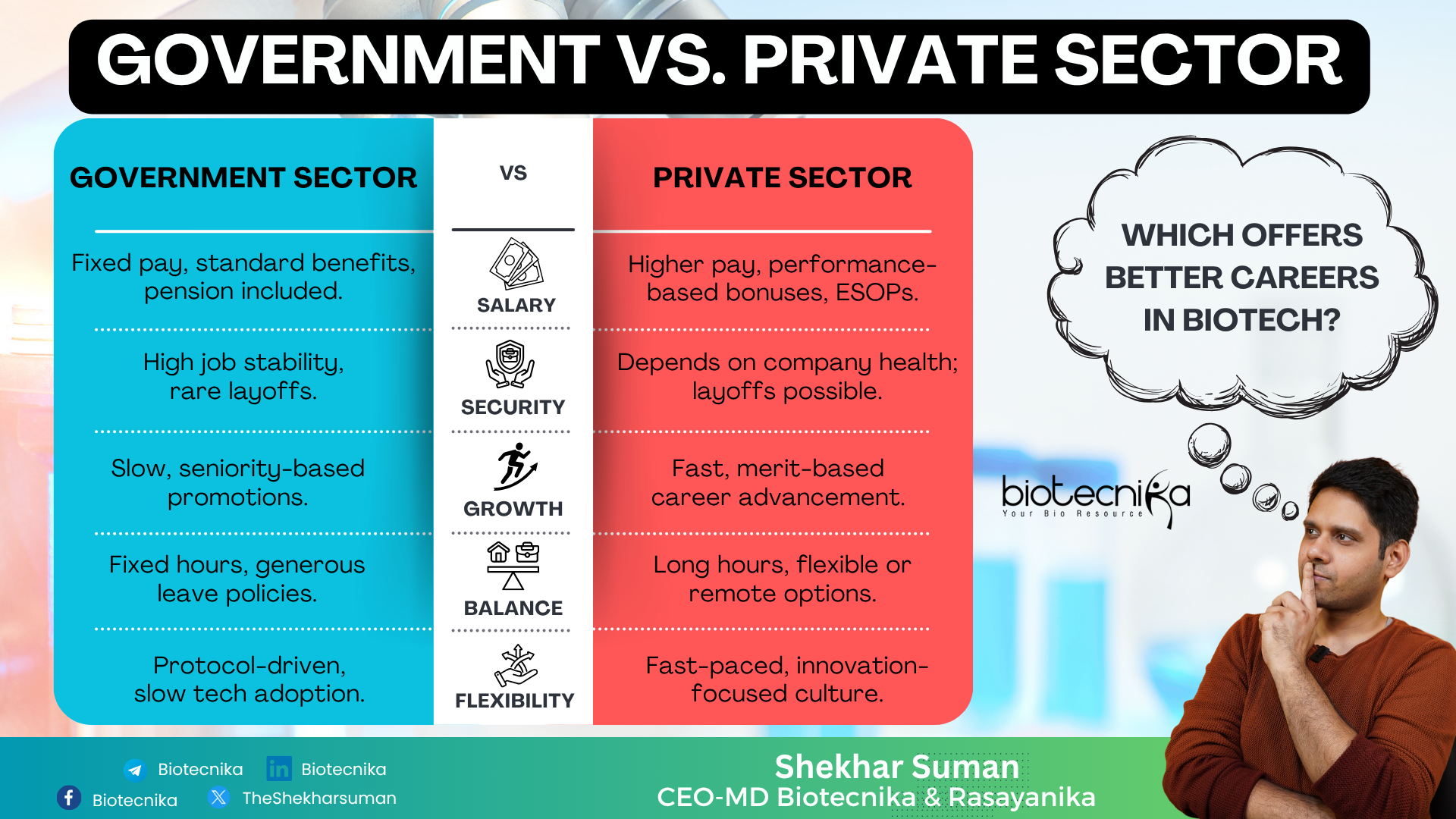Table of Contents
Govt vs Private Biotech Jobs: Which Offers Better Careers in Biotech?
“Beta, government job le lo — zindagi set ho jaayegi.” This common advice often sparks the debate of Govt vs Private Biotech Jobs among the youth.
I’m sure every Indian kid has grown up hearing this from their parents, relatives, or that one uncle who believes that a government job is the ultimate prize in life. There’s no surprise there. For decades, “Government Jobs” have symbolized stability, respect, and lifelong job security, especially in the eyes of the middle-class family.
But today, the job market is changing rapidly. The Indian biotech industry is booming, projected to hit $300 billion by 2023. The industry is expected to create over 1 million new jobs, which are more diverse, global, and competitive than ever before. From vaccine development to gene editing, agriculture innovation to AI-powered drug discovery, Biotech is where science meets the future. Career paths are no longer limited to one mold.
So, the rising question is: Is the government sector still the gold standard, or does the private sector offer a better shot at success? What sector promises an impactful career and growth?
In this article, we will unpack the pros and cons of both sectors. We will explore salary, job security, career growth, skill development, and more. Whether you dream of building biotech products or shaping national policies, we will help you decide which side of the biotech fence is right for you.
Because in today’s world, success is not just about settling down. It’s about choosing a career that helps you grow, innovate, and make a real difference, whichever path you choose.
Overview of Career Opportunities in Biotech
With the advancing technology and scientific knowledge, the biotech industry offers various career opportunities. The top career paths are:
- Research and Development (R&D): With the innovations, therapies, and technologies, the biotech industry is blooming with many opportunities in R&D.
- Regulatory Affairs: They ensure the biotech companies’ compliance with government regulations and standards.
- Quality Control and Assurance: A QC/QA professional Maintains product quality and safety.
- Production and Manufacturing: This includes scaling up processes for mass production.
- Sales and Marketing: This is the promotional part of the biotech industry, advertising about biotech products and services.
- Bioinformatics and Data Analysis: With the advanced computational tools and techniques, professionals can interpret complex biological data.
These job opportunities exist in both the govt and private sectors. However, their goals and responsibilities differ.
Government Sector Careers in Biotechnology
First let us explore the Indian biotech industry where we will talk about Government vs Private Sector. The sector offers stable and meaningful opportunities in public research, healthcare and policy-making. Have a look are the institutions and opportunities one can get in government sector.
Key Institutions and Employers
The Indian government sector has a strong infrastructure that upholds the biotech research and development. The key biotech Indian institutions are:
- Department of Biotechnology (DBT): The integral part of India’s Ministry of Science and Technology, DBT was established in 1986. The primary goal of the institution is to promote and support biotech research and development in the country. It plays an important role in funding scientific research, developing new technologies, and supporting startups. It works with national and international institutions to strengthen India’s position in the global biotech landscape.
- Autonomous Institutions: These government-funded organizations work independently to strengthen the biotech industry. They play a major role in driving scientific innovations, public health research, and policy development. The country’s top autonomous institutions are CSIR (Council of Scientific and Industrial Research), ICMR (Indian Council of Medical Research), DBT (Department of Biotechnology) institutes, and NIBMG (National Institute of Biomedical Genomics).
- Public Sector Undertakings (PSUs): These are government-owned companies held by the central or state government. Bharat Immunologicals and Biologicals Corporation Limited (BIBCOL), HLL Lifecare, and Indian Vaccine Corporation Limited (IVCOL) play vital roles in public health, vaccine production, and affordable healthcare solutions. PSUs combine the government’s mission-driven focus with an industrial, production-oriented approach.
Top Government Biotech Job Roles and Opportunities
Government sector highlights research, policy formulation, and public health initiatives. The list of top government biotech jobs is:
- Research Scientists: These professionals conduct fundamental and applied research in various biotech domains. They drive scientific progress through experiments, data analysis, and collaboration with other experts. They solve scientific problems and develop innovative technologies.
- Policy Analysts: They help the industry by developing and evaluating polices related to research, safety, ethics, and innovation. They often work with researchers, government agencies, and legal teams to ensure the biotech advances are made responsibly.
- Regulatory Officers: These officers play an important role in ensuring that biotech products meet all safety and regulatory requirements. They ensure that companies follow national and international regulations, protect public health, and maintain industry credibility.
- Academic Positions: Teaching and mentoring in universities and research institutions. They play a vital role in training the next generation of scientists and contributing to knowledge through publications and innovation.
Advantages
- Job Security: Government positions typically offer long-term stability.
- Structured Career Progression: Clear hierarchies and promotion pathways.
- Public Service Impact: Opportunities to contribute to national health and development goals.
- Access to Funding: Government-funded projects and grants support extensive research.
Challenges
- Bureaucratic Processes: Administrative procedures can be time-consuming.
- Limited Flexibility: Rigid structures may hinder rapid innovation.
- Resource Constraints: Budget allocations may limit the scope of research projects.
Private Sector Careers in Biotechnology
This fast-paced, competitive, and innovation-driven sector offers endless opportunities. From international biotech companies to emerging startups, the private sector is at the forefront of R&D. Currently, it is working on drug discovery, personalised medicines, and gene editing.
Top Biotech Private Players and Organizations
The Indian private biotech sector is growing rapidly. These players play a key role in the nation’s scientific and economic development. It includes:
- Pharmaceutical Giants like Biocon, Serum Institute of India, and Bharat Biotech are known globally for their innovation and vaccine development.
- Startups and SMEs, with over 5,300 biotech startups across India, are working on cutting-edge solutions in healthcare, agriculture, and industrial biotech.
- Contract Research Organizations (CROs) that offer high-quality research and testing services to biotech and pharma companies around the world.
These players make the private sector more vibrant. It promises exciting opportunities, innovation, and global impact.
Job Roles and Opportunities
The private sector offers diverse roles with a focus on innovation and commercialization:
- Clinical Research Associates: These associates coordinate and monitor clinical trials. They ensure protocol compliance, which is essential in drug development and testing.
- Quality Assurance and Quality Control (QA/QC) Officers: These individuals play a vital role in maintaining the high quality of biotech products during manufacturing. They are responsible for following Good Manufacturing Practices (GMP).
- Bioinformatics and data Scientists: Using advanced technology, these professionals analyse large, complex biological datasets in minutes. They boost the research procedure with computational tools.
- Business Development & Licensing Managers: They work nationally and internationally, focusing on strategic partnerships, market expansion, and licensing, strengthening the biotech industry.
Advantages
- Competitive Compensation: This sector offers higher salaries and performance-based incentives.
- Rapid Career Advancement: The individuals get promoted based on their merit and performance.
- Innovation-Driven Environment: With the creative solutions and advanced technologies, the work environment becomes more engaging and encouraging.
- Global Exposure: By collaborating with international partners and markets, employees get international exposure.
Challenges
- Job Stability: Market fluctuations can impact employment security.
- Work-Life Balance: Competitive environments may demand extended work hours.
- Regulatory Hurdles: Navigating diverse and evolving regulations can be complex.
Comparative Analysis: Govt vs Private Sector
| Aspect | Government Sector | Private Sector |
| Job Security | High | Variable |
| Salary | Fixed scales | Performance-based, generally higher |
| Career Progression | Time-bound promotions | Merit-based, faster advancement |
| Research Freedom | Focus on fundamental research | Emphasis on applied, market-driven research |
| Work Environment | Structured, with defined protocols | Dynamic, with evolving strategies |
| Innovation Potential | May be limited by bureaucracy | High, with emphasis on cutting-edge technologies |
| Global Opportunities | Limited | Extensive, with international collaborations |
| Impact Scope | National policies and public health | Market-driven solutions with global reach |
Skill Development and Career Growth for Govt vs Private Biotech Jobs
To climb the career ladder, one needs to be equipped with the skills and knowledge. This will help the individual to stand out from the crowd.
Government Sector
- Training Programs: Attend Regular Workshops and Seminars to enhance skills.
- Academic Collaborations: Take up the Opportunities for further studies and research partnerships.
- Policy Engagement: Get involved in shaping national biotechnology strategies.
Private Sector
- Professional Development: Access to certifications and specialized training to develop your professional career.
- Cross-Functional Exposure: Gain experience across various departments and projects.
- Global Networking: Participate in international conferences and collaborations.
Work-Life Balance and Organizational Culture
Government Sector
- Predictable Schedules: Standard working hours with public holidays.
- Supportive Environment: Emphasis on employee welfare and benefits.
- Community Impact: Work aligned with societal development goals.
Private Sector
- Flexible Hours: May require extended or irregular working times.
- Performance-Oriented Culture: High expectations with corresponding rewards.
- Innovation Focus: Encouragement of creative problem-solving and entrepreneurship.
Strategic Considerations for Career Choice
When doing a comparison between Govt vs Private Biotech Jobs and careers in life sciences, consider the following:
- Personal Goals: Align your career path with long-term aspirations.
- Risk Tolerance: Evaluate your comfort with job stability versus dynamic environments.
- Value Alignment: Choose an organization whose mission resonates with your values.
- Growth Opportunities: Assess potential for professional and personal development.
Indian biotech is no longer a niche field. It is a national priority and a global contender. Whether you dream of crafting policies at government organizations or developing therapies in a corporate lab, this is the right time to join the blooming Indian biotech industry.
On one hand, the government sector offers stability, purpose, and societal impact. It is ideal for those who value structure, service, and long-term security. On the other hand, the private sector is for ambitious, risk-taking, innovation-hungry individuals. It has a fast-paced environment, global exposure, attractive income, and rapid growth.
The choice of Govt vs Private Biotech Jobs is no longer about which is better—it‘s all about which is better for you. Explore both sectors through internships, talk to experts, and reflect on your strengths and values. Because the future of biotech is not just in labs or policy—it is in the hands of people like you.
Choose wisely. The next breakthrough might just have your name on it.

































